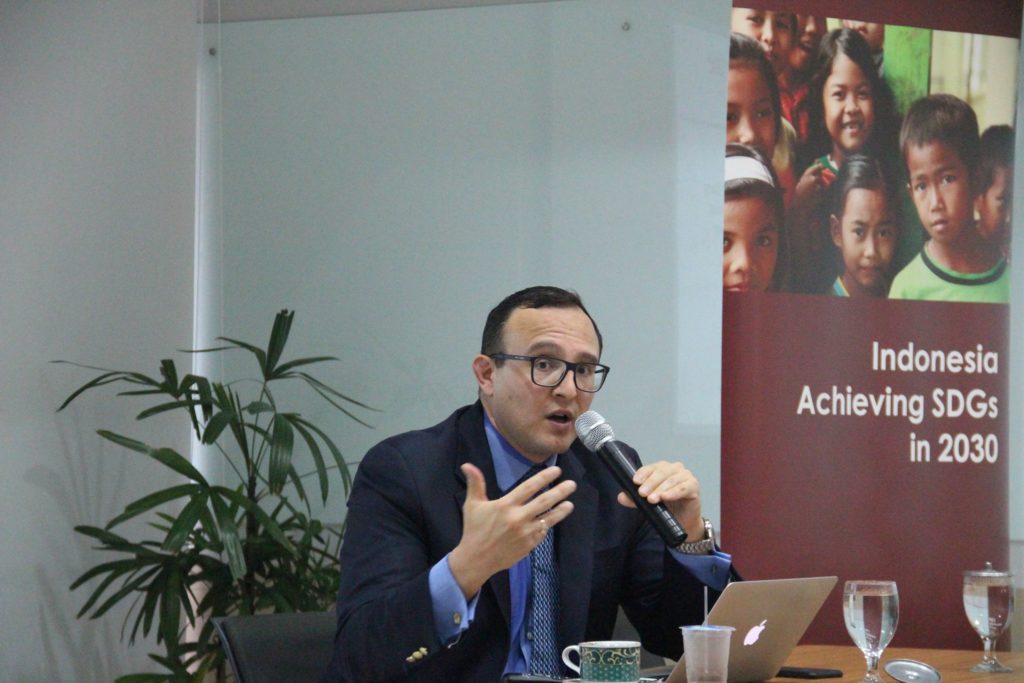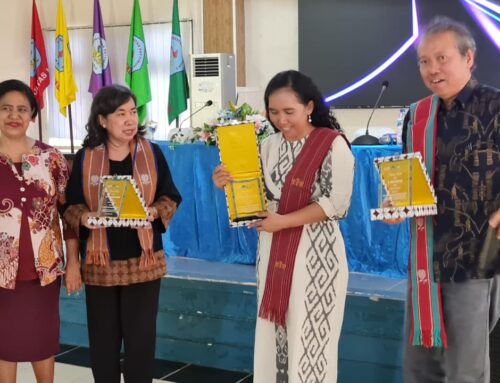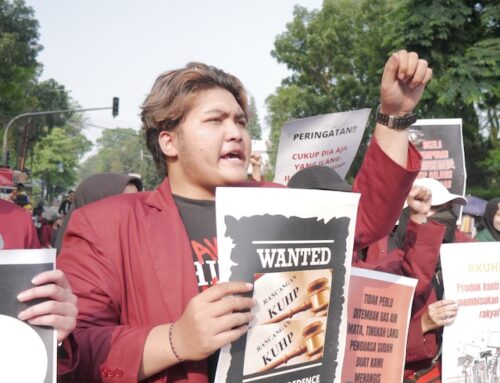the FKP seminar on 29 August 2017 featured Eduardo J. (Department of International Development, King’s College London) who presented his upcoming book entitled Geopolitics in Health: Confronting Obesity, AIDS, and Tuberculosis in the Emerging BRICS Economies. The topic of his presentation was considered timely given the emergence of communicable and non-communicable diseases cases in emerging countries, which many of them resembled Indonesia much. The seminar was hosted by the SDGs Center at the Universitas Padjadjaran and held at LPEM UI Building in Jakarta.
Brazil, Russia, India, China, and South Africa (collectively known as BRICS) and other emerging economics, including Indonesia, have experienced a nutrition transition, a term referring to a condition where the average health condition of a population moves from undernourishment to overweight and obesity. Wider access to cheap foods due to increased international trade and anti-poverty programs causes the diet change. It is important to note, however, that the change in nutrition intake is just one part of the whole story. As the countries become more affluence and the share of agricultural sector in the economies decreases, people are no longer using much physical activity to support their living, which fosters the possibility of getting overweight and obese. The BRICS is also facing the climbing number of HIV/AIDS cases, as well as tuberculosis, particularly in Russia and South Africa. Eduardo observed that these countries had shown different behavior in responding to health epidemics. He’s specifically interested in the argument of geopolitical positioning in scrutinizing factors producing policy response that differs across countries.
Geopolitical positioning framework analyses the interests and incentives of political leaders to respond to international criticisms and pressures for an improved response to health epidemics. Internationally favorable response carried out by domestic government may be related to willingness to pursue international financial and technical assistance to achieve the objectives. Brazil, India, and China are known for adopting positive positioning to eventually increase their own international reputations, while on the contrary, Russia and South Africa appear to be impervious to the criticisms. Furthermore, Eduardo also admitted that, although important as it may seem to be, the argument of geopolitical positioning only provides a necessary but insufficient condition. Domestic governments need to establish strong partnerships with civil society in securing financial and political supports. Hence, favorable health policy response can help government to increase legitimacy inward and international reputation. Brazil is one successful case of concocting international assistance and civil society involvement in tackling health issues, proven by the plummeting number of cases and deaths of AIDS in 2010. Starting around 2005, government of Brazil has steadily slimmed down World Banks loans and began to independently use the national budget to finance national AIDS program.
Indonesia is also confronting the obesity and AIDS epidemics. Maintaining international reputation is necessary; however encouraging civil society participation is paramount to achieve sustainable condition, considering the structure of fiscal and government of Indonesia follows decentralization scheme, which requires further attention from the people. One attendance asked an interesting question on the impact of the presence of national health insurance in Indonesia with low premium that might induce counter behaviors, i.e. national health insurance beneficiaries perceived to be far cheaper than preventing diseases. The question was confirming the point that Eduardo made about the importance of local governments’ role in providing information and incentives related to disease prevention.

![[FKP hosted by Universitas Padjadjaran] Kesehatan ibu pasca melahirkan di Indonesia](https://www.fkpindonesia.org/wp-content/uploads/2024/02/fkp-2024-02-21-thumbnail-500x383.jpg)

![[FKP hosted by ANU Indonesia Project] The pursuit of food self-sufficiency in Indonesia: food-trade policy preferences during the administrations of Yudhoyono (2004-2014) and Widodo (2014-present)](https://www.fkpindonesia.org/wp-content/uploads/2024/01/fkp-2024-01-16-500x383.jpg)
![[FKP hosted by ANU Indonesia Project & SMERU] Prepayment, price, and welfare: a study on electricity demand in Indonesia](https://www.fkpindonesia.org/wp-content/uploads/2023/02/fkp-2024-01-19-thumbnail-summary-500x383.png)
